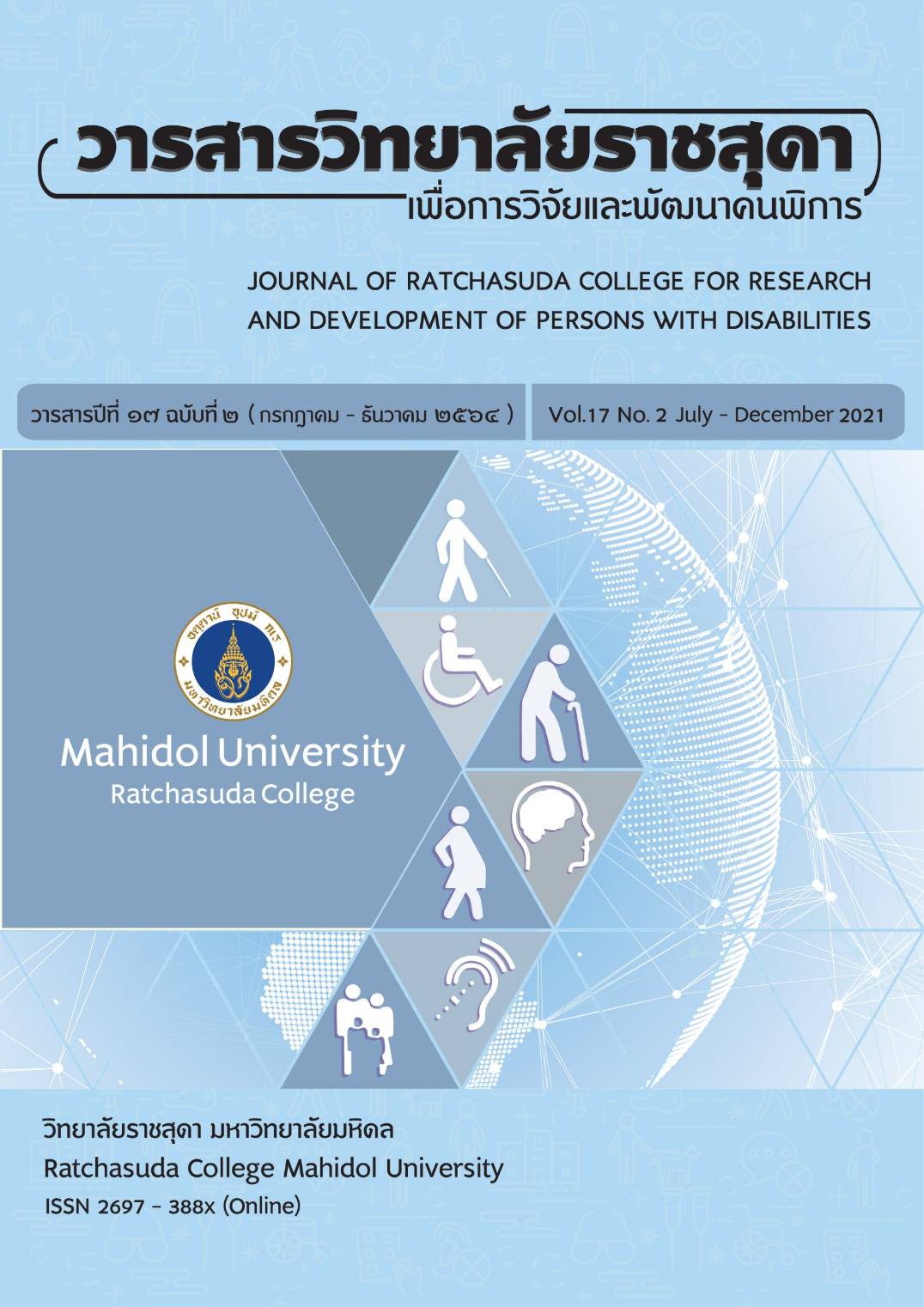Music Teaching Strategies in Inclusive Elementary Classroom: Perspective of Music Teachers’ Experiences
Keywords:
Music, Teaching strategies, Inclusive classroom, Elementary educationAbstract
The purpose of this qualitative study was to study music teaching strategies for inclusive elementary classroom from perspective of six music teachers’ experience. The data were collected by semi-structured interviews, non-participant observation in an inclusive music classroom and reviewing document related to music teaching strategies for inclusive elementary classroom. Qualitative data were analyzed using inductive data analysis. The results were presented in the form of narrative data. The results showed that music teachers presented four perspectives related to music teaching strategies in an inclusive classroom which were 1) understanding and realization of individual needs of the students and consulting with special education teachers to collaboratively design the lesson; 2) designing the instruction to meet student’s potential; 3) using various techniques to effectively support the instruction including clear and easy instructions, frequently motivating students response throughout the lesson, using peer-assisted learning and enjoyable activities; and 4) adapting the instruction to suit to students’ needs.
Downloads
References
Abramo, J. (2012). Disability in the Classroom: Current Trends and Impacts on Music Education. Music
Educators Journal, 99(1), 39-45. Retrieved March 25, 2019, from http://www. jstor.org/ stable/41692695
Adamek, M., & Darrow, A. A. (2010). Music in special education. Silver Spring, MD: America Therapy Association.
Cassidy, J. (1990). Managing the Mainstreamed Classroom. Music Educators Journal, 76(8), 40-43. Retrieved March 25, 2019, from http://www.jstor.org/stable/3401055
CAST. (2020). About universal design for learning. Retrieved from http://www.cast.org/impact/universal-design-for-learning-udl
Creswell, J. W. (1998). Qualitative inquiry and research design: Choosing among five Traditions. London: Sage Publications.
Darrow, A. A. (2010). Music Education for All: Employing the Principles of Universal Design to Educational Practice. General Music Today, 24(1), 43-45. Retrieved from https://doi.org/10.1177/1048371310376901
Darrow, A. A., & Adamek, M. (2018). Instructional Strategies for the Inclusive Music Classroom. General Music Today, 31(3), 61–65. Retrieved from https://doi.org/10.1177/1048371318756625
Haider, M., & Yasmin, A. (2015). Significance of Scaffolding and Peer Tutoring in the Light of Vygotsky’s Theory of Zone of Proximal Development. International Journal of Languages, 1(3), 170-173. Retrieved from http://www.ijlll.org/vol1/33- L310.pdf
Hammel, A. (2004). Inclusion Strategies That Work. Music Educators Journal, 90(5), 33-37. Retrieved from http://www.jstor.org/stable/3400021
Heward, L. (2014). Exceptional Children an Introduction to Special Education. Edinburgh gate: Pearson education limited.
Individuals with Disability Education Act (IDEA). (1975). Retrieved March 29, 2019, from https:/sites.ed.gov/idea /idea-news-and-updates/#2020
Jellison, J., & Draper, E. (2015). Music Research in Inclusive School Settings: 1975 to 2013. Journal of Research in Music Education, 62(4), 325-331. Retrieved March 25, 2019, from http://www.jstor.org/stable/43900262
Ministry of Education, Thailand. (2008). Basic Education Core Curriculum B.E. 2551 (2008). Retrieved from http://academic.obec.go.th/images/document/1525235513_d_1.pdf
Suttachitt, N. (2018). Music Education: Principles and Subject Matters. Bangkok: Chulalongkorn University Press.
Thai Government Gazette. (2008). The Education Provision for Persons with Disabilities Act, B.E 2551 (2008). Retrieved from http://www.moe.go.th/moe/nipa/ ed_law/p.r.g.edu35.pdf
The Council for Exceptional Children [CEC]. (2020). Who are exceptional learners. Retrieved from https://www.cec.sped.org/Special-Ed-Topics/Who-Are-Exceptional-Learners
Downloads
Published
How to Cite
Issue
Section
License
Copyright (c) 2021 JOURNAL OF RATCHASUDA COLLEGE FOR RESEARCH AND DEVELOPMENT OF PERSONS WITH DISABILITIES

This work is licensed under a Creative Commons Attribution-NonCommercial-NoDerivatives 4.0 International License.
บทความที่ได้รับการตีพิมพ์เป็นลิขสิทธิ์ของวารสารสถาบันราชสุดาเพื่อการวิจัยและพัฒนาคนพิการ






